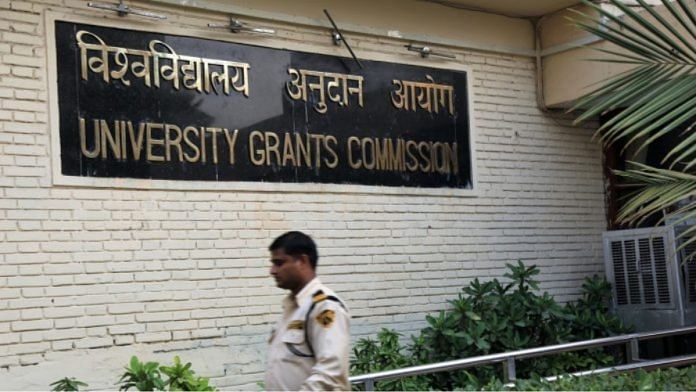New Delhi: The University Grants Commission (UGC) wants to “promote holistic development in both academic and non-academic spheres” among students through its two-degree programme, according to guidelines released by the country’s highest statutory body for higher education.
The UGC sent official guidelines on its proposed two-degree programme to colleges and universities across India Wednesday, a day after Chairman M. Jagadesh Kumar announced the initiative. It’s not mandatory for universities to adopt the guidelines, Kumar has clarified.
The programme will allow students to pursue two undergraduate degrees, two postgraduate degrees, or two diploma programmes together.
Kumar said Tuesday that the two degrees could be completed either in physical classroom mode, one online and one offline, or both in online mode.
While the UGC says the idea behind the two-degree programme is to make students “well-rounded”, some educationists say they are worried it could lead to additional strain on students and even cause a decline in the quality of education. Even so, the policy has generated support too, with some professors noting that it could help provide a fillip to courses that are less commonly pursued, such as music.
Also Read: IISc, IIT programmes under India’s ‘eminence scheme’ feature in top 100 world rankings by subject
What is UGC’s two-degree programme?
The UGC announced Tuesday that students could simultaneously pursue two college degrees of their choice instead of the single one that the education system currently offers.
The UGC’s policy document on the two-degree programme, accessed by ThePrint, says the idea is to enable an individual “to study one or more specialised areas of interest at a deep level, and also develop character, ethical and constitutional values, intellectual curiosity, scientific temper, creativity, spirit of service”.
The policy document says that the aim is to offer a range of disciplines — including sciences, social sciences, arts, humanities, languages, as well as professional, technical, and vocational subjects — to make students “thoughtful, well-rounded, and creative individuals” and to prepare them for “more meaningful and satisfying lives and work roles and enable economic independence”.
The new policy will apply to graduate, postgraduate, and diploma courses and will be implemented the next academic year, M. Jagadesh Kumar Kumar told ThePrint.
Colleges and institutions have been given the freedom to implement the policy how they see fit: They can have their own tie-ups, and take a decision on whether to hold entrance exams for their educational programmes, Kumar said.
For now, the two degrees will only be non-technical programmes that are approved by the UGC. They can be a combination of subjects from different streams — that is humanities, science and commerce — and admission will be granted depending on the eligibility of the student and the availability of programmes, Kumar told ThePrint.
Also Read: After central universities, UGC wants state-run & deemed-to-be institutions to come under CUET
Educationists divided
Many educationists ThePrint spoke to said they were unsure about the benefits of the new policy, adding that pursuing two full-time degrees could exhaust students and even lead to poor education.
“A certificate programme can be done along with a degree programme. Even a diploma is alright,” Aditya Narayan Misha, a professor at Delhi University, said. “But to expect students to pursue two full-time degree programmes simultaneously is making a mockery of the education system. What will the student even learn if he/she keeps hopping from one programme to another.”
Another faculty member at Delhi University, Rajesh Jha, said that pursuing two degrees simultaneously would rob students of valuable college experiences.
“With the four-year undergraduate programme (FYUP), education is going to become multi-disciplinary anyway,” he said. “Then why add this two-degree programme? How is it going to benefit students? If anything, it will dilute the value of the Honours programme.”
“Expecting students to pursue two programmes together and earn credits for each of them individually is a bit of an overreach,” a former chairman of UGC, who did want to be named, said. “I am not sure of the kind of traction this idea will generate,” he said.
However, the policy also has its supporters, like Professor Jasmine Gohil, Associate Dean, Academic Affairs, at Anant National University, Ahmedabad.
She admitted that the UGC needs to shed light on the policy’s implementation — especially with regard to the inevitable administrative challenges that such a policy will pose — but believes allowing students to pursue more than one degree will help broaden their knowledge, skills, and their abilities at problem-solving.
Besides, it would help give a push to the degrees that are less commonly pursued, such as music or fine arts, she told ThePrint.
“I hope to see more professionals armed with a degree in music, fine arts, or literature,” she told The Print. It will contribute to not only their professional development and success but also to their happiness.”
(Edited By Uttara Ramaswamy)
Also Read: UGC’s undergrad programme draft plagiarised from US universities, alleges DU teachers’ body



